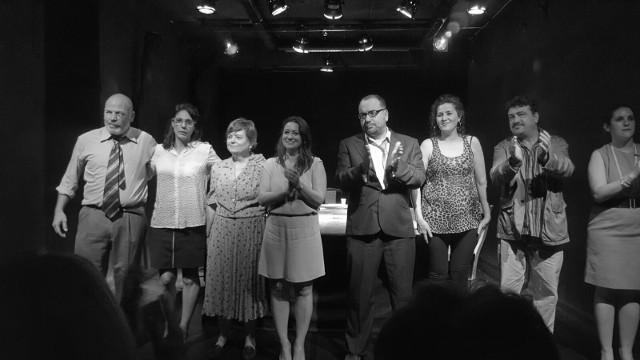Laura (on the right) and her theatre group during her semester abroad in Madrid. Photo courtesy of Laura Peracca.
This article originally appeared on VICE Italy
Videos by VICE
Erasmus exchange programs are generally a great way to study abroad for a semester, make friends from all over Europe, have a thorough STI scare and learn everything there is to learn about other cultures’ budget beer brands. It’s a beautiful opportunity to discover the world in your early twenties—or, if my best friend’s mum Laura is to be believed, your early sixties.
Laura Peracca is 61 and has just returned from six months on an Erasmus program in Madrid. While there, she became a minor local celebrity for being the oldest Erasmus student Madrid has ever seen.
VICE: Why did you decide to do an Erasmus program at 61?
Laura Peracca: I was talking to my son one night, when he told me about a friend of his who was doing the Erasmus program. I was a couple of years into my psychology degree at the time, so I jokingly asked him if I could do the same. He was pretty sure that people in their sixties wouldn’t qualify, but when I looked it up I found that there’s actually no age limit to the Erasmus program. Still, I didn’t think I would get through the process, but I did.
What did your children think?
They were sceptical at first. My son thought I was stealing a 21-year-old’s opportunity and already imagined me frantically cleaning a flat I’d share with five housemates and their bongs. But they grew to like the idea. I didn’t know much about it, aside from what I’d heard from my children’s friends and from the movie L’Auberge Espagnole.

Laura (third from the left) during a theatre class in Madrid
Why did you decide to go to Spain?
I originally wanted to go to Norway, but my husband had decided to come with me and didn’t want to go somewhere with three hours of daylight. I’ve already been to France a lot, so Spain seemed like an obvious choice. I found a flat for myself and my husband joined me 15 days later. So I didn’t share a place with other students.
To be perfectly honest here, when I was at uni we never interacted with the older students. What were your classes like?
Well, the other students pretty much ignored me, yeah. When the classes started, teachers read names and nationalities out to make it easier to socialize, but that didn’t really work for me. Other Italian students lost interest in me after about five minutes. I did much better with foreign students—Brazilians, Hungarians, Koreans and many Chinese students.
What did you do in your spare time? I take it you never tried to smuggle Mercadona beers into a club night where Sven Väth was playing?
Not really, no. I was on a mailing list for all the parties, but I’d have felt silly going. I took theatre and Spanish classes outside of the university—I met a lot of people there who I went out to explore the city with. Usually in between classes I’d go for a swim in the campus pool and in the evenings my husband and I would take a little stroll and have dinner somewhere. On nights we stayed in we watched a Spanish TV series, El Ministerio del Tiempo.
What’s the most Erasmus-y experience you had?
I went to some meet-up in a pub with other Erasmus students and had a Chinese dinner in an underground parking.
You became a bit of a local celebrity, didn’t you?
Well, yes, a bit. One night my husband’s daughter called to say that a friend of hers who’s a cartoonist had asked if he could make a cartoon about me for the Corriere della sera [an Italian major newspaper]. He visited me in Madrid and the cartoon appeared in the paper a few weeks later. An editor from El Mundo [the second largest newspaper in Spain] had seen it and asked to run it, too—that’s when I started getting some serious attention. Local channel TeleMadrid interviewed me—I was “la estudiante de Erasmus más veterana,” the oldest Erasmus student.
Did you have the impression that the stereotypes about Erasmus life—easier exams, excessive boozing and lots of international sex—are true?
The exams were definitely easier. I took four classes and only one exam was a bit harder. But I have to say I didn’t witness any of the stereotypical debauchery. Other students went to parties but they were always on time for classes and passed their exams with flying colors.
So what’s next for you?
At the end of my stay in Madrid I broke down crying because I didn’t want to go home. I’m a few months away from getting my degree now. I’m considering doing a master’s after this, and maybe even do a second Erasmus semester.
More on VICE:
Photos of What’s Inside Swedish Students’ Fridges




